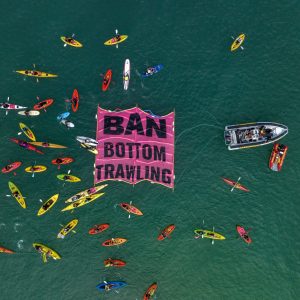LegaSea asked the Green Party to provide comment on their party’s fisheries policy. The Green Party of Aotearoa New Zealand provided this statement.
Abundant fisheries and sustainable seas
 Eugenie Sage, Green Party fisheries spokesperson
Eugenie Sage, Green Party fisheries spokesperson
The Green Party stands for protecting our oceans and ensuring healthy ecosystems and abundant fisheries.
Sadly, under the National government, our fisheries management system is failing. The Ministry for Primary Industries’ (MPI) Director of Fisheries Management has said:
- “discarding is a systemic failure of the current system and something we have not been able to get on top of from day 1 of the QMS”;
- while the tonnage cannot be quantified “we suspect they are significant to the point that they are impacting on stocks”; and
- “if we found the golden bullet to stop discarding, we would probably put over half of the inshore fleet out of business overnight”.
The crux of the problem is that too many commercial fishing operations are breaking the law by high grading fish and dumping less profitable fish species. Despite acknowledging and having evidence of the problem, the fisheries regulator, the Ministry for Primary Industries, has prosecuted too few commercial fishers for dumping.
We need a thorough inquiry into fisheries management and the operation of the quota system. The truth needs to come out about industry culture and the extent to which MPI is captured and influenced by the industry. We need an inquiry to identify the changes needed for effective and independent regulation of the industry and sustainable management of our fisheries. A commission of inquiry could ensure wide public consultation, enable whistle-blowers to provide confidential testimony, and develop substantive recommendations for change.
The Green Party knows some things definitely need to change. Fish stocks need to be better managed so that they are abundant and marine ecosystems are healthy. Changing the law to replace “maximum sustainable yield” as the benchmark for management of fish stocks with a new benchmark of “a minimum 50% of the unfished biomass” would be a good start. It would help protect the future of our fisheries for the long term.
New Zealanders’ right to put a feed of fish on the family dinner table and Maori customary takes should take priority over the profits of commercial fishing companies. Changes to the Fisheries Act could ensure that recreational and customary fishers get higher priority in quota and catch allocation decisions.
The law also needs changing to stop the commercial industry’s bykill of thousands of seabirds, hundreds of fur seals and dozens of dolphins and New Zealand sea lions each year. Deer hunters can’t kill kiwi or kea while hunting. Commercial fishers shouldn’t be able to kill our protected native wildlife either.
How the Fisheries Act is implemented needs a major overhaul to implement its purpose of sustainable fisheries management. We should be protecting large areas of our inshore coast from high impact, industrial fishing methods such as trawling, Danish seining and dredging. This would benefit nature and recreational fishers.
The Hauraki Gulf would be a priority area to do this given the major decline in fish stocks and the Gulf’s huge value for recreation. The recommendations from the collaborative Sea Change report are a basis for change. If marine spatial planning is used more widely we can better recognise and provide for the range of interests in our fisheries and oceans.
Returning to a stand-alone Ministry of Fisheries, rather than having it buried within MPI would help sharpen the focus on fisheries management. Replacing it with an Oceans Agency with a broader mandate is another option.
We need a network of marine protected areas, not just close to the coast inside the 12-mile limit as National has proposed, but in our deep oceans as well. We have the fourth largest EEZ in the world and must better implement our international responsibilities to preserve and protect our oceans.
The Green Party would end deep sea oil exploration with its risks to the climate and of catastrophic oil spills. We would put a moratorium on destructive seabed mining and establish a blue whale sanctuary off the Taranaki coast to protect this important feeding habitat for these magnificent marine mammals.
Changing the way we care for and manage our oceans and fisheries requires a change of government. A Party vote for the Green Party is a vote for healthy oceans and abundant fisheries and a strong Green presence in Parliament to help achieve this.
More information
I Fish. I Care. I Vote – How does this policy compare to other party’s fisheries policies?
LegaSea’s Manifesto – See how this policy compares to our five policy planks.





